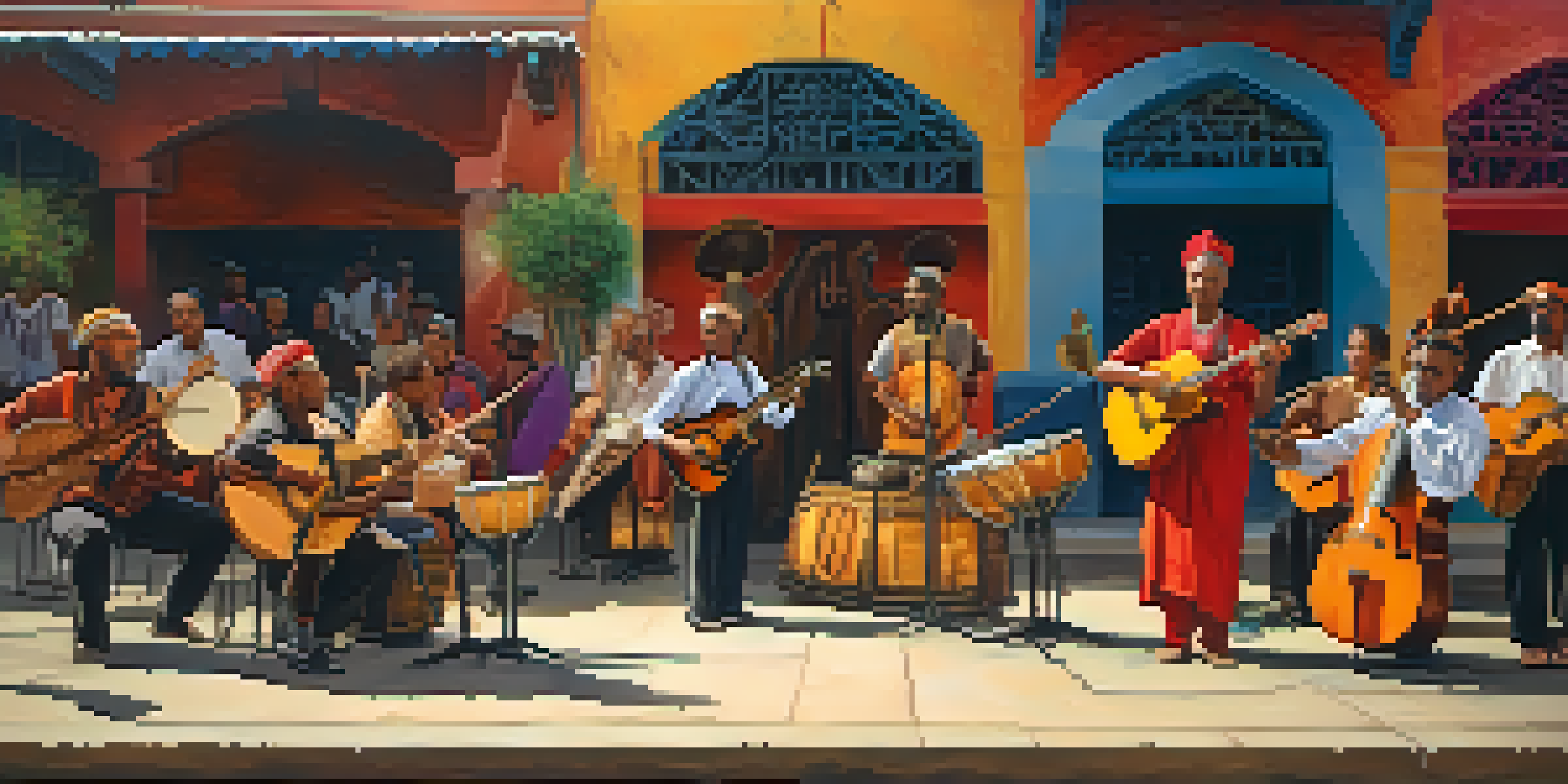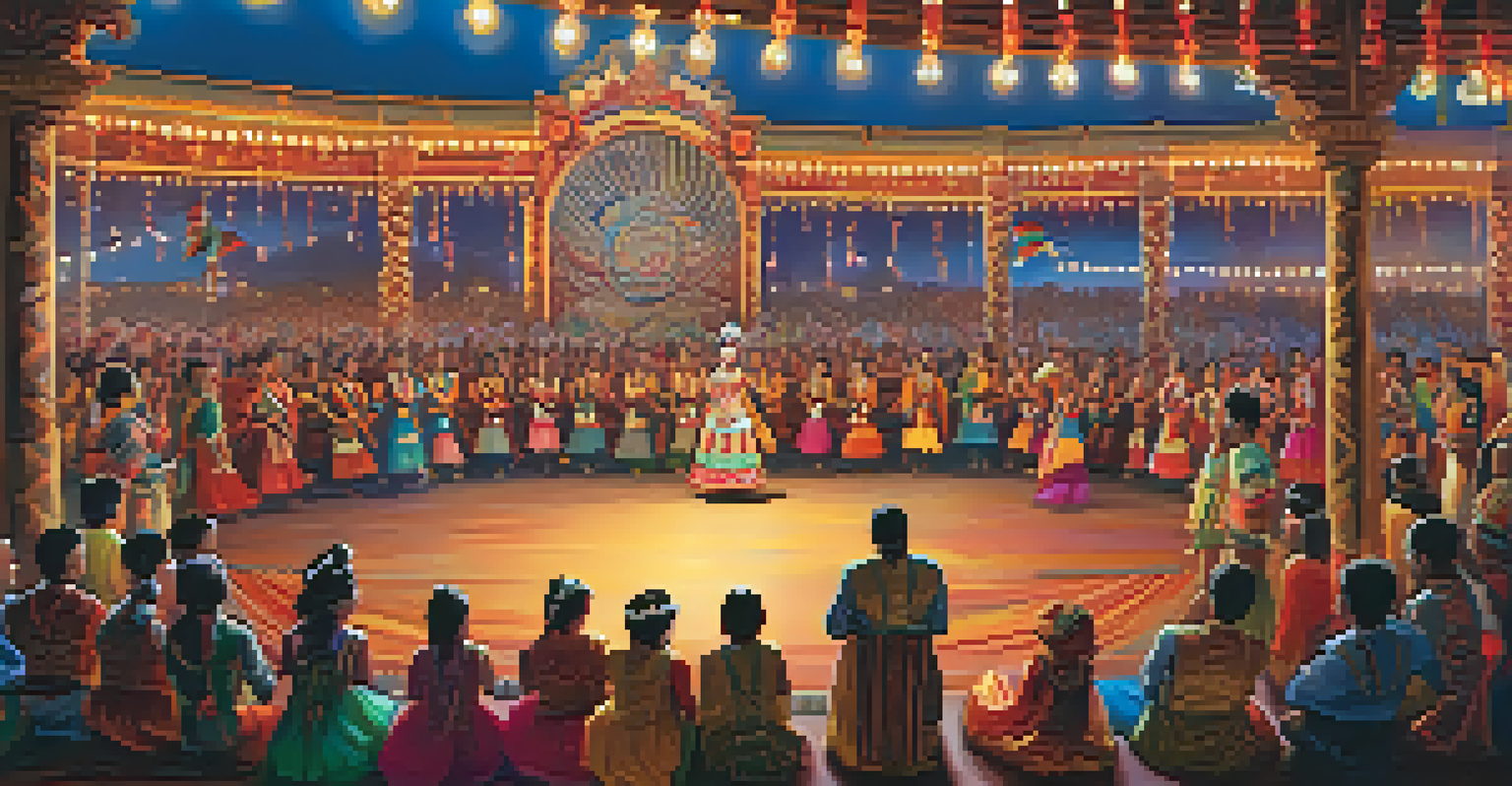The Influence of Music on Cultural Identity and Artistic Expression

Understanding Cultural Identity Through Music
Cultural identity is often expressed through various forms of art, and music plays a vital role in this process. It serves as a reflection of shared experiences, beliefs, and traditions within a community. For instance, traditional folk songs can encapsulate the history and values of a particular culture, allowing listeners to connect with their roots.
Music is the shorthand of emotion.
Moreover, music has the power to unite people across different backgrounds. When individuals come together to enjoy a performance, they participate in a shared cultural experience that transcends language barriers. This collective engagement fosters a sense of belonging and pride among community members, reinforcing their cultural identity.
Additionally, as cultures evolve, so does their music, adapting to contemporary influences while still retaining core elements. This dynamic relationship allows for the preservation of cultural heritage while embracing innovation, showcasing how music is both a historical record and a living expression of identity.
Music as a Tool for Artistic Expression
Artists often use music as a canvas to express their thoughts, emotions, and societal issues. Through lyrics and melodies, they can convey messages that resonate with their audience, creating a powerful means of communication. For example, protest songs have historically united people around social causes, using music to inspire change.

Moreover, the genre of music chosen by an artist can reflect their cultural background and personal experiences. A hip-hop artist may weave in elements of their upbringing, while a classical musician might draw from their cultural traditions. This diversity enriches the artistic landscape and encourages listeners to appreciate different perspectives.
Music Reflects Cultural Identity
Music serves as a powerful medium for expressing cultural identity, encapsulating shared experiences, beliefs, and traditions within communities.
As artists push boundaries and experiment with new sounds, they contribute to the evolution of music genres, further enhancing artistic expression. Collaborations across genres and cultures can lead to innovative creations that challenge norms and encourage dialogue among listeners, ultimately enriching the cultural tapestry.
The Role of Music in Cultural Preservation
Music has long been a means of preserving cultural heritage, serving as a vessel for storytelling. Traditional songs often carry historical narratives and folklore that are passed down through generations, ensuring that cultural stories are not forgotten. For example, Indigenous music often incorporates elements of nature and spirituality, reflecting the community's relationship with the land.
Without music, life would be a mistake.
In times of globalization, where many cultures risk dilution, music can act as a safeguard for cultural identity. By celebrating and promoting traditional music, communities can strengthen their cultural ties and educate others about their heritage. Festivals and cultural events often highlight these traditional performances, fostering appreciation and understanding.
Furthermore, digital platforms have made it easier for traditional music to reach a global audience. Artists can share their cultural sounds online, inviting listeners from around the world to engage with their heritage. This exposure not only preserves these musical forms but also encourages intercultural dialogue and exchange.
The Emotional Impact of Music on Identity
Music has an extraordinary ability to evoke emotions, and this emotional resonance contributes to personal and cultural identity. Many people associate specific songs with pivotal moments in their lives, creating lasting connections with their cultural background. For instance, a national anthem may evoke pride and nostalgia during significant events.
Moreover, music can provide solace and a sense of belonging during challenging times. For individuals navigating their cultural identity, songs that reflect their experiences can be particularly comforting. This emotional connection reinforces the idea that music is not just entertainment; it is a source of healing and understanding.
Artistic Expression Through Sound
Artists use music to convey thoughts and emotions, often addressing societal issues while reflecting their cultural backgrounds.
Additionally, artists often draw from their emotional experiences to create music that resonates with others facing similar struggles. This shared emotional journey fosters a sense of community, allowing listeners to feel seen and understood. Through these connections, music becomes an integral part of cultural identity and personal expression.
Cross-Cultural Influences in Music
As societies become more interconnected, cross-cultural influences in music have flourished, enriching artistic expression. Musicians often blend elements from different genres and traditions, creating unique sounds that reflect a globalized world. For instance, the fusion of reggae and hip-hop has produced a vibrant subculture that resonates with diverse audiences.
This blending of musical styles not only showcases creativity but also promotes cultural exchange. When artists collaborate across genres and cultures, they create opportunities for dialogue and understanding. These collaborations break down barriers and foster appreciation for the richness of diverse musical traditions.
Moreover, such cross-cultural interactions can lead to the rediscovery of traditional forms of music. By incorporating contemporary influences, artists can breathe new life into forgotten genres, ensuring their survival while appealing to modern audiences. This process highlights the dynamic nature of music as an art form that continuously evolves.
Music's Role in Shaping Youth Culture
Music plays a pivotal role in shaping youth culture, influencing everything from fashion to social movements. For many young people, music serves as a form of self-expression and a way to explore their identity. The genres they gravitate towards often reflect their values, aspirations, and affiliations, creating a powerful sense of belonging.
Furthermore, youth movements have historically used music as a rallying cry for social change. From the anti-war anthems of the 1960s to contemporary protest songs, music has united young people in their pursuit of justice and equality. This connection empowers them to voice their concerns and advocate for their beliefs through artistic expression.
Music Preserves Cultural Heritage
Traditional music acts as a vessel for storytelling and heritage preservation, ensuring cultural narratives are passed down through generations.
As technology advances, the way young people consume and share music continues to evolve. Platforms like social media and streaming services allow them to discover diverse sounds and connect with artists from around the globe. This accessibility fosters a rich tapestry of cultural influences, shaping a generation that values creativity and collaboration.
Conclusion: The Lasting Impact of Music on Culture
In conclusion, music remains a powerful force in shaping cultural identity and artistic expression. Its ability to reflect shared experiences, evoke emotions, and foster connection makes it an essential component of society. As cultures continue to evolve, music will undoubtedly play a crucial role in preserving traditions while embracing new influences.
Furthermore, the interplay between music and cultural identity highlights the importance of understanding diverse perspectives. By engaging with different musical traditions, we can appreciate the richness of global cultures and promote empathy among communities. This understanding ultimately strengthens the social fabric and encourages collaboration.

As we navigate an increasingly interconnected world, the influence of music on cultural identity will persist, inspiring future generations to express themselves creatively. Whether through traditional forms or contemporary innovations, music will continue to be a vital part of our shared human experience.